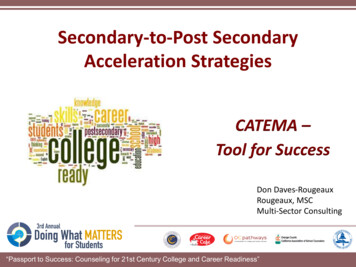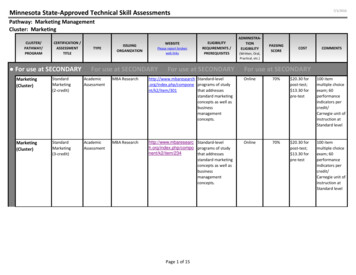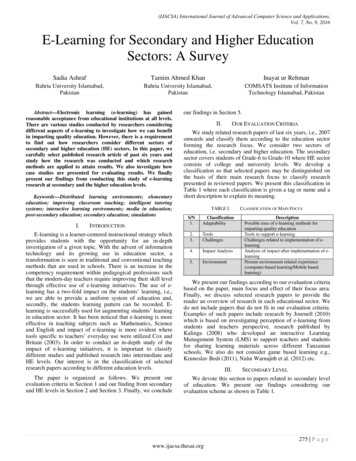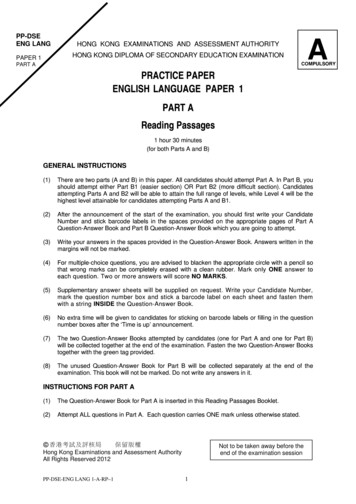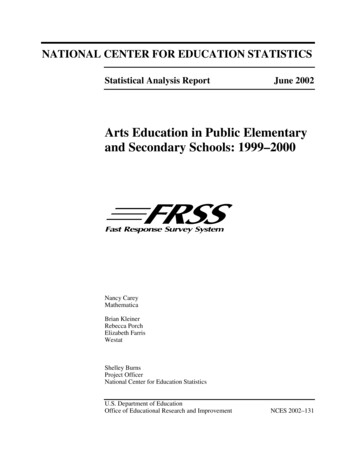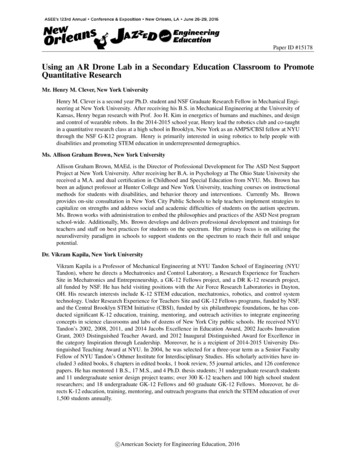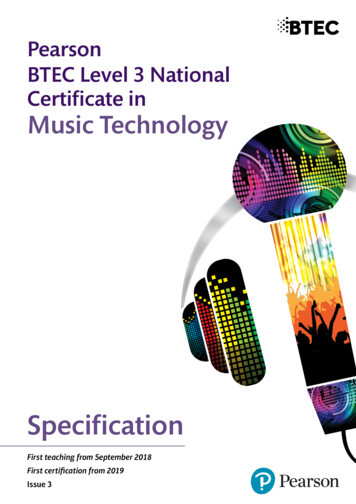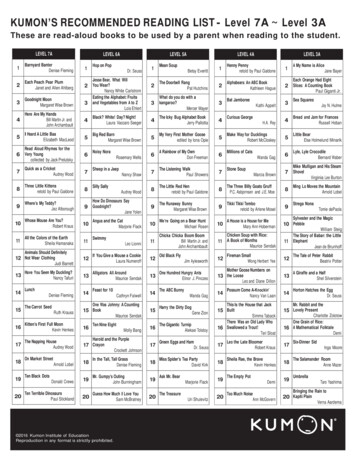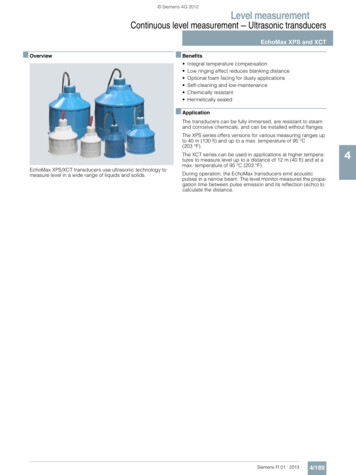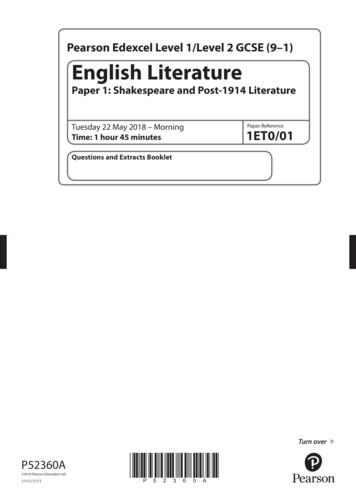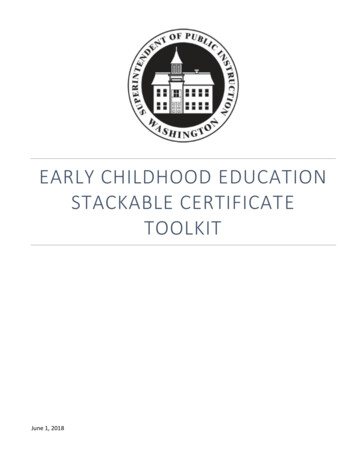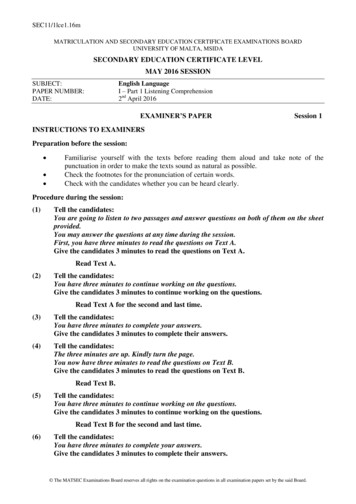
Transcription
SEC11/1lce1.16mMATRICULATION AND SECONDARY EDUCATION CERTIFICATE EXAMINATIONS BOARDUNIVERSITY OF MALTA, MSIDASECONDARY EDUCATION CERTIFICATE LEVELMAY 2016 SESSIONSUBJECT:PAPER NUMBER:DATE:English LanguageI – Part 1 Listening Comprehension2nd April 2016EXAMINER’S PAPERSession 1INSTRUCTIONS TO EXAMINERSPreparation before the session: Familiarise yourself with the texts before reading them aloud and take note of thepunctuation in order to make the texts sound as natural as possible.Check the footnotes for the pronunciation of certain words.Check with the candidates whether you can be heard clearly.Procedure during the session:(1)Tell the candidates:You are going to listen to two passages and answer questions on both of them on the sheetprovided.You may answer the questions at any time during the session.First, you have three minutes to read the questions on Text A.Give the candidates 3 minutes to read the questions on Text A.Read Text A.(2)Tell the candidates:You have three minutes to continue working on the questions.Give the candidates 3 minutes to continue working on the questions.Read Text A for the second and last time.(3)Tell the candidates:You have three minutes to complete your answers.Give the candidates 3 minutes to complete their answers.(4)Tell the candidates:The three minutes are up. Kindly turn the page.You now have three minutes to read the questions on Text B.Give the candidates 3 minutes to read the questions on Text B.Read Text B.(5)Tell the candidates:You have three minutes to continue working on the questions.Give the candidates 3 minutes to continue working on the questions.Read Text B for the second and last time.(6)Tell the candidates:You have three minutes to complete your answers.Give the candidates 3 minutes to complete their answers. The MATSEC Examinations Board reserves all rights on the examination questions in all examination papers set by the said Board.
SEC11/1lce1.16mThe examiner reads out the following:Text AYou are going to listen to a talk about the history of milk.The history of milk begins 12,000 years ago, when nomadic tribes decided to stop roving and settledown in farming communities. This era is generally referred to as the Agricultural Revolution; withit came domesticated animals and the advent of by-products such as milk.Later, in ancient Egypt, milk and other dairy products were available, but reserved for royalty,priests and the very wealthy. By the fifth century in Western Europe, milk was obtained from bothcows and sheep, but in the fourteenth century, cow’s milk was more popular. However, milk wasnever the drink of choice amongst the general populace. In Britain and other Western Europeancountries, in the sixteenth and seventeenth centuries, beer, cider and other alcoholic drinks werepopular, but not milk.In Western Europe and the United States in the nineteenth century, milk was becoming morecommon, but only for infants. Babies could only drink fresh cow’s milk because the further it gotfrom the cows which produced it, the more it was likely to be contaminated by bacteria.As infant mortality rose in cities, practices for making milk safer began to emerge. Louis Pasteur'sresearch demonstrated that harmful microbes in milk and wine caused sickness, and he invented aprocess – now called pasteurization. In this process liquids are rapidly heated and cooled to killmost of the organisms. Commercial pasteurization machines were introduced in 1895.Pasteur is also credited with revolutionizing the safety of milk and, in turn, the ability to store anddistribute milk well beyond the farm. The first glass milk bottle was patented in 1884 by Dr HenryThatcher, after he witnessed a milkman making deliveries from an open bucket into which a child’sfilthy rag doll had accidentally fallen. In the 1930s, milk cans were replaced with large on-farmstorage tanks.In the 1950s and 1960s, many dairies began to introduce the square paper carton to replace bottles.The new cartons reduced the cost of milk for consumers since disposable paper cartons werecheaper than glass bottles.And so began the journey of the acceptance of milk as a staple of the Western diet.Page 2 of 3
SEC11/1lce1.16mThe examiner reads out the following:Text BNow you are going to listen to a programme in the series My Career.I’m Amy White and I’m going to talk about how I became a gardener. I’m 27 and I’ve known Iwanted to be a gardener since I was 14. My mother was an interior designer and we moved housefrequently because she loved doing up old houses. The inside of our house was always creative andimmaculate, but the garden was always in a mess because no one had any interest in it. I alwaysthought it was a pity, so I took up the challenge.Lacking the funds to go to university, I was forced to leave school at 18 and I completed a diploma inhorticulture at Newton College. Then I was given a 40-hour a week post at Cottage Garden Nurseryin Longtown and I fitted in a degree in garden design simultaneously. I started the nursery job in thecoldest winter in ten years. It proved my passion for gardening because when you’re out in thefreezing glass houses and only your fingers are moving in cold, wet compost, it’s a challenge at best.However, it’s the best experience I’ve had because I got to see plants at every stage of life. I sawplants as seedlings in spring, as flowers in summer and as twigs in winter. It’s rewarding when yousee plants you’ve grown going home with an eager gardener.Five years ago, I moved to London to be near the leading nurseries and in no time I discovered thatgardening is a different experience in the capital because people there are more demanding. It can befrustrating when a client insists on something which you know is wrong. One wanted me to remove ahedge from his front garden and replace it with a plant which didn’t go with the rest of the street.However, London does have its rewards which are visible and enduring. The best thing is the sense ofachievement when you start with a barren garden and then see the transformation.For those of you who dream of becoming gardeners, I advise you to get as much hands-on experienceas possible and a thorough grounding in plants before focussing on the more glamorous options ofgarden design. You have to be a manager, salesperson, artist and architect. The one thing it doesn’tinvolve, I’m afraid, is weekends pottering in my own garden. Now that I live in London, I have tomake do with two flower pots outside my flat.Page 3 of 3
SEC11/1lce2.16mMATRICULATION AND SECONDARY EDUCATION CERTIFICATE EXAMINATIONS BOARDUNIVERSITY OF MALTA, MSIDASECONDARY EDUCATION CERTIFICATE LEVELMAY 2016 SESSIONSUBJECT:PAPER NUMBER:DATE:English LanguageI – Part 1 Listening Comprehension2nd April 2016EXAMINER’S PAPERSession 2INSTRUCTIONS TO EXAMINERSPreparation before the session: Familiarise yourself with the texts before reading them aloud and take note of thepunctuation in order to make the texts sound as natural as possible.Check the footnotes for the pronunciation of certain words.Check with the candidates whether you can be heard clearly.Procedure during the session:(1)Tell the candidates:You are going to listen to two passages and answer questions on both of them on the sheetprovided.You may answer the questions at any time during the session.First, you have three minutes to read the questions on Text A.Give the candidates 3 minutes to read the questions on Text A.Read Text A.(2)Tell the candidates:You have three minutes to continue working on the questions.Give the candidates 3 minutes to continue working on the questions.Read Text A for the second and last time.(3)Tell the candidates:You have three minutes to complete your answers.Give the candidates 3 minutes to complete their answers.(4)Tell the candidates:The three minutes are up. Kindly turn the page.You now have three minutes to read the questions on Text B.Give the candidates 3 minutes to read the questions on Text B.Read Text B.(5)Tell the candidates:You have three minutes to continue working on the questions.Give the candidates 3 minutes to continue working on the questions.Read Text B for the second and last time.(6)Tell the candidates:You have three minutes to complete your answers.Give the candidates 3 minutes to complete their answers. The MATSEC Examinations Board reserves all rights on the examination questions in all examination papers set by the said Board.
SEC11/1lce2.16mThe examiner reads out the following:Text AYou are going to listen to a talk about the history of tea.Although the custom of drinking tea dates back to 5,000 years ago in China, it was not until theseventeenth century that the beverage first appeared in Britain.The use of tea spread gradually from China, reaching Europe around 1560, although it was thePortuguese and Dutch traders who first imported tea to Europe, with regular shipments by 1610.Britain was a latecomer to the tea trade as the East India Company did not capitalise on tea’spopularity until the mid-eighteenth century.Curiously, it was the 500 London coffee houses that were responsible for introducing tea to Britain.Tea gained popularity so quickly in the coffee houses that by 1750, tea had become the preferreddrink of Britain’s lower classes.A 1676 law taxed tea and required coffee house operators to apply for a licence. This was just thegovernment’s attempt to profit from the popularity of tea in Britain. By the mid-eighteenth century,the duty on tea had reached an absurd 119%. This heavy taxation had the effect of creating a wholenew industry – tea smuggling. In 1784 William Pitt introduced the Commutation Act. This droppedthe tax on tea to 12.5%, effectively ending smuggling, which led to the opening of the teashop.The teashop can be traced to one person. In 1864 the manager of a bread company began the customof serving food and drink to her customers. Her best customers were served tea. Soon everyone wasasking for the same treatment. The concept of teashops spread throughout Britain like wildfire.In the early twentieth century, tea bags were invented in America, but sales only really took off inBritain in the 1970s. Nowadays, it would be hard for many tea drinkers to imagine life without them.Such is the British enthusiasm for tea, that even after the dismantling of the Empire, Britishcompanies continue to play a leading role in the world’s tea trade and British brands still dominatethe world market. With recent scientific research indicating that tea drinking may have direct healthbenefits, it is assured that for centuries to come, there will be a place at the centre of British life for anice cup of tea.Page 2 of 3
SEC11/1lce2.16mThe examiner reads out the following:Text BNow you are going to listen to a programme in the series My Career.I’m Paul Smith and I’m going to talk about how I became a helicopter pilot. I’m 44 and I haven’tbeen a pilot for long. I started my career as a newscaster but I left because I felt it was becomingrepetitive and I also felt undervalued. So I started my own decorating business and later I set up ashop specialising in hats for women. One day an airline pilot came in; when I told her how much I’dlove to fly, she suggested I give it a try. I passed the necessary medical tests and I enrolled for fouryears of training at Surrey aerodrome. After that I also trained at Cranfield flying school for a fewmonths.I was forced to make major changes in order to fund my qualification. I sold my shop and movedback in with my parents before completing my advanced pilot training in 2008. I began looking for ajob as a helicopter pilot just as the recession started and so there weren’t many openings for me. Imanaged to pick up a job as a flying instructor. Although it was a case of the blind leading the blind,as I feel I only had marginally more experience than my students, I still felt sure of myself on the firstday.After that, through a network of contacts, I heard of a helicopter company that was expanding in theSeychelles and so I used the last of my money to fly out there and beg for a job in person. Luckily, Iwas offered a job flying tourists around the islands. Really, as a helicopter pilot, you’re a glorifiedchauffeur so if you’re not a people person, it’s not the right job. I’d picked up numerous customerskills when I used to run the shop and that’s where I learned how to deal with people and soothe themwhen they become aggressive.Helicopters appeal to me more than aeroplanes because the experience is more thrilling. Flying anaeroplane is a bit like playing a video game in which you push a few buttons and the aeroplane fliesitself. Helicopters, on the other hand, require precise mental and physical co-ordination. Eight yearson, flying hasn’t lost its edge for me but I must say, it’s a hard-won thrill. Hundreds of hours oftraining and thousands of pounds are required for a pilot to become employable and even then jobscan be hard to come by.Page 3 of 3
SEC11/1lce3.16mMATRICULATION AND SECONDARY EDUCATION CERTIFICATE EXAMINATIONS BOARDUNIVERSITY OF MALTA, MSIDASECONDARY EDUCATION CERTIFICATE LEVELMAY 2016 SESSIONSUBJECT:PAPER NUMBER:DATE:English LanguageI – Part 1 Listening Comprehension2nd April 2016EXAMINER’S PAPERSession 3INSTRUCTIONS TO EXAMINERSPreparation before the session: Familiarise yourself with the texts before reading them aloud and take note of thepunctuation in order to make the texts sound as natural as possible.Check the footnotes for the pronunciation of certain words.Check with the candidates whether you can be heard clearly.Procedure during the session:(1)Tell the candidates:You are going to listen to two passages and answer questions on both of them on the sheetprovided.You may answer the questions at any time during the session.First, you have three minutes to read the questions on Text A.Give the candidates 3 minutes to read the questions on Text A.Read Text A.(2)Tell the candidates:You have three minutes to continue workin
Lacking the funds to go to university, I was forced to leave school at 18 and I completed a diploma in horticulture at Newton College. Then I was given a 40-hour a week post at Cottage Garden Nursery in Longtown and I fitted in a degree in garden design simultaneously. I started the nursery job in the coldest winter in ten years. It proved my passion for gardening because when you’re out in .
